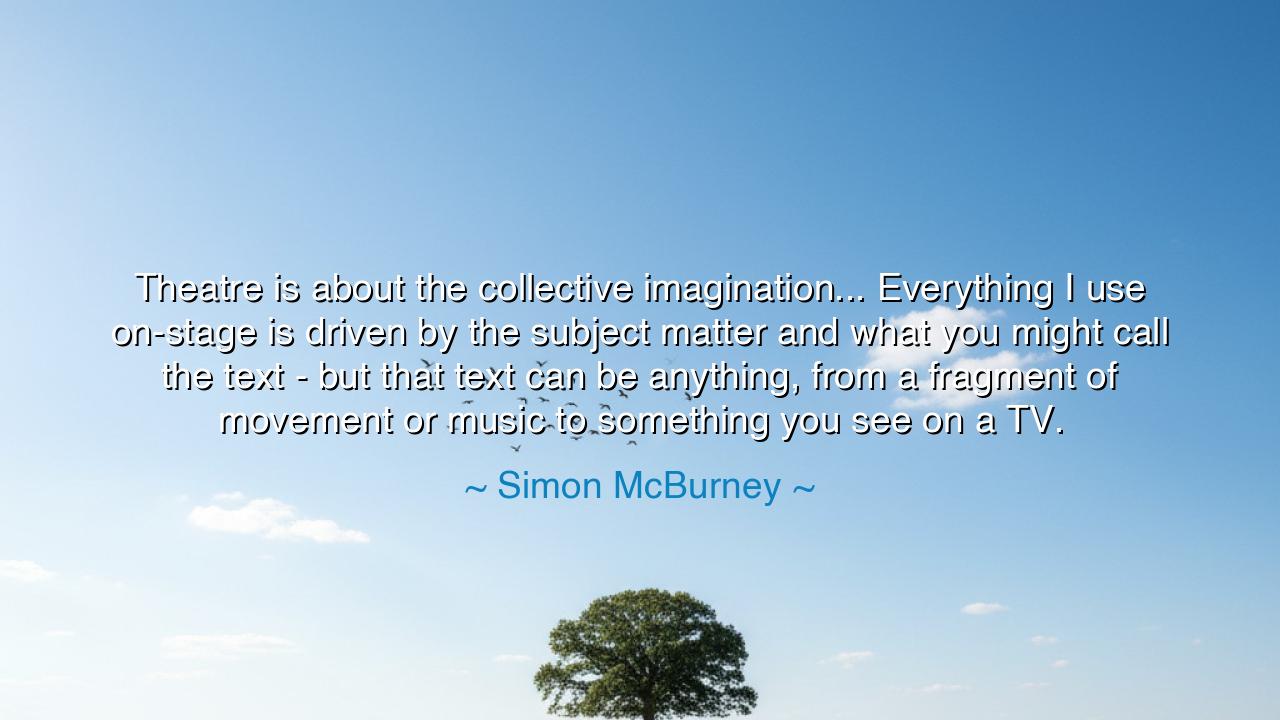
Theatre is about the collective imagination... Everything I use
Theatre is about the collective imagination... Everything I use on-stage is driven by the subject matter and what you might call the text - but that text can be anything, from a fragment of movement or music to something you see on a TV.






“Theatre is about the collective imagination... Everything I use on-stage is driven by the subject matter and what you might call the text — but that text can be anything, from a fragment of movement or music to something you see on a TV.” — thus spoke Simon McBurney, master of the stage and alchemist of storytelling, whose art transforms the seen and the unseen into one living breath. In these words, he reminds us that theatre, the oldest mirror of the human soul, is not merely the recitation of lines or the repetition of tradition. It is the meeting place of minds — the collective imagination of artists and audience alike, breathing together to summon worlds that never were and yet have always been.
When McBurney speaks of the collective imagination, he touches upon a truth as ancient as civilization itself. Long before written words or gilded theatres, our ancestors gathered around the fire to tell their stories. In the flicker of flame, they saw heroes and spirits; in the rhythm of their voices, they felt the heartbeat of the earth. That was the first theatre — not of scripts, but of shared vision, where each listener completed the tale within their own mind. Theatre, in its purest form, is a covenant between souls, a ritual of imagination that binds the many into one. It lives not upon the stage but in the invisible bridge that connects storyteller and witness.
McBurney, founder of the legendary Complicité Theatre Company, carries this ancestral fire into the modern age. He rejects the notion that theatre must be confined to written text, declaring instead that “text can be anything” — a gesture, a sound, a shadow on a wall. This is not rebellion but revelation. For what is theatre but the transformation of life into meaning? Every movement, every note, every image holds the power to speak to the soul. McBurney teaches that the stage is not a place of artifice, but of translation — where the smallest fragment of existence, even a flicker on a TV screen, may become the language of truth.
History itself bears witness to this truth. In ancient Greece, the birthplace of drama, theatre was not mere entertainment; it was communion with the gods. When the chorus sang and the actors cried out to the heavens, it was the collective imagination of a people that gave voice to their fears and hopes. Later, in the Middle Ages, wandering players performed in marketplaces, transforming humble spaces into realms of divinity and folly. And even in our modern times, when the lights dim and the audience holds its breath, the same ancient magic awakens — the power of many minds imagining as one.
McBurney’s wisdom also carries a deeper message about art and creation. To say that the text “can be anything” is to proclaim that inspiration knows no hierarchy. The sacred and the mundane are equal before the artist’s gaze. A scrap of music, a broken phrase, a glimpse of human movement — all can become the seed of creation. For the true artist, nothing is too small, nothing is unworthy. This is the humility and the glory of imagination: it gathers the fragments of life and, through vision and empathy, binds them into harmony.
In this teaching, there is also freedom. McBurney reminds us that theatre — and indeed, all art — must not be chained by convention. It must live, breathe, and evolve, drawing nourishment from every corner of the world. The creative soul must wander boldly, gathering inspiration wherever it may appear — in nature, in laughter, in silence, even in the hum of machines. For imagination is not a possession but a shared current, flowing through all things. To create is not to command but to listen — to let the world speak in its many voices, and then to answer in kind.
The lesson, then, is clear: to live fully, we must all become participants in the collective imagination. Whether we stand upon the stage or sit in the crowd, we must bring our minds and hearts awake to the living art of existence. See the theatre not as a distant performance, but as a mirror of life itself — where every sound, every gesture, every moment of stillness is part of the great play of being. When you listen deeply, when you imagine freely, you become part of that sacred circle which began around the first fire and continues to this very day.
Thus, remember the wisdom of Simon McBurney: theatre — and life — is made not by one, but by all. Cherish your imagination, and lend it to the chorus of humanity. Let every small thing you encounter — a fragment of music, a passing glance, the rhythm of your own heartbeat — become the text through which you discover meaning. For the world itself is a stage of infinite stories, and through our collective imagination, we bring them to life again and again, in endless communion, beneath the eternal light of creation.






AAdministratorAdministrator
Welcome, honored guests. Please leave a comment, we will respond soon